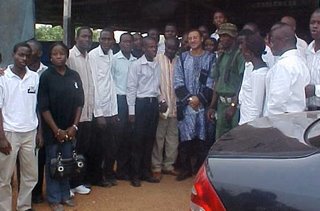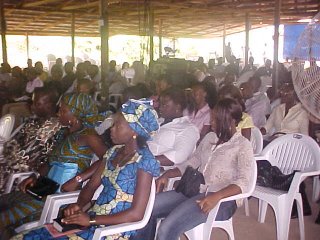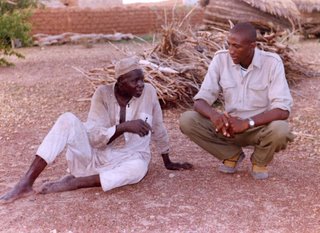Friday, December 22, 2006
Earlier in the week I made a call at an interesting place-the Lagos- Ibadan Expressway office of DMT Mobile Toilets Limited -on behave of a not for profit organisation that I happen to be on her board. The mission was to make an enquiry about the prospect of working with them to execute one of our programmes scheduled to kick-off in two Nigerian states next year (God willing).
It was not until then I better appreciated the business and social entrepreneurial acumen of Nigeria’s beloveth Isaac Durojaiye a.k.a OTUNBA GADAFFI, the man who has made a difference in the improvement of public health and social transformation by providing job opportunities and better sanitation through his mobile toilets enterprise.
Sometimes, some things we neglect, perhaps despise could be potentially rewarding ventures. That reminds me; a few hours ago I listened to one of my favourite tapes, a lecture delivered by a respected People and Organisations development guru. He jokingly said, sometimes the right things are directly the opposite of what the crowds do.
I think I can better infer some sense from that statement looking at the success story of DMT Mobile Toilets, where Shit business is truly a serious business.
The Fast moving multi-million Naira ‘agbe po’, shit carrier Venture of OTUNBA GADAFFI is not only creating a ‘modest’ source of sustenance for the Otunba alone, but scores of his direct and indirect employees, including an eloquent customer service representative who professionally attended to my inquiry as I overheard the Otunba talk with his banker who brought a charismas card for him. Not surprising, the Otunba exchange the gesture by giving the banker two DMT charismas cards, one personal and the other for the staff of his branch.
Shit as you drive! Even on the Third Mainland.
High-level hygiene and sanitation!
DMT has a not for profit arm that is committed to giving free toilets to schools and unemployed women in order to promote better hygiene, health and empowering women in the society.
Otunba Gadaffi has won a good number of laurels from reputable organisations at home and abroad to commend what a lot of people see as his extra-ordinary entrepreneurial acumen and contributions to the society
Thursday, December 14, 2006

Photo Copyright:http://www.fodors.com/wire/archives/002222.cfm
I finally got started.
Sometimes ago my Chairman adviced that more than ever before there was need to have a vivid picture of ones dream .An opinion I think I strongly agree with.
Today i got it!
Atleast I am able to have the first picture of so many pictures.
The picture is of my ranch taken 12 midnight, 31st Dec. 2015.
The location is Kogi State, Central Nigeria.
By that day the facility would generate at least 1,000,000 known direct jobs worldwide.
Powered via renewables.
Wednesday, December 06, 2006
The report, from the World Institute for Development Economics Research at the UN University, says that the poorer half of the world's population own barely 1% of global wealth.
There have of course been many studies of worldwide inequality.
But what is new about this report, the authors say, is its coverage.
It deals with all countries in the world - either actual data or estimates based on statistical analysis - and it deals with wealth, where most previous research has looked at income.
What they mean by wealth in this study is what people own, less what they owe - their debts. The assets include land, buildings, animals and financial assets.
Different assets
The analysis shows, as have many other less comprehensive studies, striking divergences in wealth between countries.
Wealth is heavily concentrated in North America, Europe and some countries in the Asia Pacific region, such as Japan and Australia.

These countries account for 90% of household wealth.
The study also finds that inequality is sharper in wealth than in annual income.
And it uncovers some striking differences in the types of assets that dominate in different countries.
In less developed nations, land and farm assets are more important, reflecting the greater importance of agriculture in those economies.
In addition, the report says the weighting is the result of "immature" financial institutions, which make it much harder for people to have savings accounts or shares.
In contrast, some citizens of the rich countries have more debt than assets - making them, the report says, among the poorest in the world in terms of household wealth.
However, they are presumably better off in terms of what they consume than many people in developing countries.
Comprehensive
The survey is based on data for the year 2000. The authors say a more recent year would have involved more gaps in the data. As it is, many figures - especially for developing countries - have had to be estimated.

Nonetheless, the authors say it is the most comprehensive study of personal wealth ever undertaken.
Why does it matter? Because wealth serves as insurance against times when income tends to fall, such as unemployment, sickness or old age.
It is also a source of finance for small businesses, a particularly important point since it is the countries with lower levels of personal wealth which also tend to have weaker financial systems without the funds, ability or inclination to lend to small firms.
The report is not about policy recommendations.
But one of the authors, Professor Anthony Shorrocks, says it does draw attention to the importance of enhancing banking systems in developing countries to help generate the funds for business investment.
Courtesy ; Andrew WalkerMonday, November 20, 2006
Some pictures from the 180 degrees seminar at


(Below) :Ibikunle(M),Tolu(L) and her
Friend,Bimbo.Two final year students
with a smart blue print of how they want
to be creators of jobs after school.
Above:A cross section of Paticipa
 nts at the seminar.
nts at the seminar.Below:Second from Left, Ambassador Sesan, Prof. Utomi and Mr. Akinyemi

Friday, November 17, 2006
Last Saturday 11th November, 180 degrees (www.my180degrees.com), an organization created to help people achieve self development and empowerment had a seminar at
The seminar addressed a number of issues, Key among them was entrepreneurship.
As you would expect, during the interactive session a student raised a ‘point ‘about having enterprising ideas but not been able to actualize it because of funds constrains.
The professor advised a proper feasibility study to be made in order to be sure such ventures are truly enterprising. He said a lot of individuals and organizations are readily available to fund profitable ventures, if only a ‘strong’ feasibility study would suggest that such ventures are truly profitable.
If this thinking is a way forward, to fund profitable ventures, then it will be a smart idea for southern –developing –nations to invest in institutions and ideas that will enhance credible feasibility reports. Just like the American style.
Friday, November 10, 2006
Think and make a reflection!
“Our deepest fear is not that we are inadequate. Our deepest fear is that we are powerful beyond measure. It is our light, not our darkness that most frightens us. We ask ourselves, Who am I to be brilliant, gorgeous, talented, fabulous? Actually, who are you not to be? You are a child of God. Your playing small does not serve the world. There is nothing enlightened about shrinking so that other people won't feel insecure around you. We are all meant to shine, as children do. We were born to make manifest the glory of God that is within us. It's not just in some of us; it's in everyone. And as we let our own light shine, we unconsciously give other people permission to do the same. As we are liberated from our own fear, our presence automatically liberates others.”
Nelson Rolihlahla Mandela - Inauguration Speech May 10, 1994
Former president Rep. of South Africa
"We will have time to reach the Millennium Development Goals – worldwide and in most, or even all, individual countries – but only if we break with business as usual.
We cannot win overnight. Success will require sustained action across the entire decade between now and the deadline. It takes time to train the teachers, nurses and engineers; to build the roads, schools and hospitals; to grow the small and large businesses able to create the jobs and income needed. So we must start now. And we must more than double global development assistance over the next few years. Nothing less will help to achieve
the Goals."
United Nations Secretary-General
Kofi A. Annan
Tuesday, November 07, 2006
Private Sector Development (PSD) is a strategy for promoting economic growth and reducing poverty in developing countries by incorporating private industry and competitive markets into a country's overall development framework.
Supporters argue that PSD is an important part of poverty reduction. It is said that the private sector can go along way in developing countries toward the provision of basic services, empowering the poor by improving quality and access to health services, education and infrastructure. Strategies and best practices for ensuring that private sector development is pro-poor is a popular topic for policy makers.
However,this school of thought rightly holds that we should concern ourselves with issues of wealth creation rather than send our time to discuss poverty and it root causes.
The justification for this thinking is that for too long scholarly efforts and thinking have been directed to studying poverty without any meaningful results. Hence, there has dot to be a rethink.
Friday, October 20, 2006
MY THOUGHT TODAY
I think we’d work better on the MDGs if the awareness about the goals is intensified and a new paradigm introduced.
What paradigm? What about if the private sector is seen more as partner, I mean committed partners on the road to the achievement of the MDGs? Maybe corporations, whatever their sizes, around the world commit a proportion of their yearly profit before tax to the MDGS.
Monday, October 16, 2006
What is new?
In the past few days a number of events have occurred which have direct interrelatedness to the global fight against extreme poverty. I will talk about two of these developments.
First is the winning of the Nobel Peace prize by the Bangladeshi Banker, Muhammad Yunus. Prof. Yunus founded the Grameen Bank. According to the Nobel Committee;
“Muhammad Yunus has shown himself to be a leader who has managed to translate visions into practical action for the benefit of millions of people, not only in Bangladesh, but also in many other countries. Loans to poor people without any financial security had appeared to be an impossible idea. From modest beginnings three decades ago, Yunus has, first and foremost through Grameen Bank, developed micro-credit into an ever more important instrument in the struggle against poverty. Grameen Bank has been a source of ideas and models for the many institutions in the field of micro-credit that have sprung up around the world.”
I believe we can ‘steal’ from his idea to fight poverty where ever we are around the world.
The second is the election of the South Korean diplomat, Ban Ki Moon as the United Nations’ Secretary–General Designate.
Even though some people have reverenced him more as a “secretary than general”, the question raised is about his efficiency and effectiveness on his future role as the head of the world’s largest bureaucracy.
Nonetheless some keen observers have said judgments should not be passed on his competence before he assumes office just because he is less controversial, or because of his modest Korean civil service background.
However, he has made an open fierce criticism of the North Korean recent claim of a nuclear bomb test in his present capacity as his country’s Foreign minister. Most observers of the UN system are much expectance of his stance on other world issues like the MDGs.
Please view, make your comments and analysis.
Friday, October 13, 2006
Politicians from around the world must also stop rhetoric, cultivate the habit of sincerity and action. While the southern nations have to shun corruption.
Good governance is particularly important for economic growth.
Development workers and policy makers have to work closer with the beneficiaries of their efforts, who are their clients in other to understand what the real priorities are.This could mean going to the remotest communities in Africa, Asia ,…where ever.

